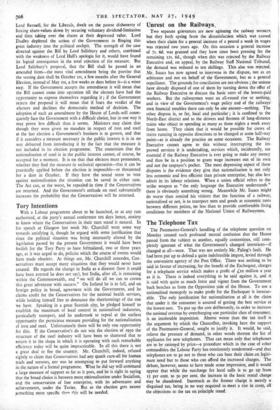Tory Intentions
With a Labour programme about to be launched, or at any rate authorised, at the party's annual conference ten days hence, anxiety to know where the Conservatives in their turn stand is natural. In his speech at Glasgow last week Mr. Churchill went some way towards, satisfying it, though he argued with some justification that since the political situation was being constantly altered by the legislation passed by the present Government it would have been foolish for the Tory Party to have formulated, two or three years ago, as it was urged to do, policies which the course of events would have made obsolete. As things are, Mr. Churchill concedes, Con- servatives must accept many situations that they would never have created. He regards the change in India as a disaster (how it could have been averted he does not say), but India, after all, is remaining within the Commonwealth, and " we will do all we can to crown this great adventure with success." On Ireland he is in full, and on foreign policy in broad, agreement with the Government, and he claims credit for the Conservatives for the national health services, while holding himself free to denounce the shortcomings of the one we have. Speaking in a great Scottish city, he pledged himself to establish the maximum of local control in nationalised industries, particularly transport, and he undertook to repeal at the earliest opportunity the pernicious measure providing for the nationalisation of iron and steel. Unfortunately there will be only one opportunity for this. If the Conservative's do not win the election of 195o the structure of the steel industry will have been so shattered that to return it to the shape in which it is operating with such remarkable efficiency today will be quite impracticable. In all this there is not a great deal to fire the country. Mr. Churchill, indeed, refused rightly to claim that Conservatives had any quack cure-all for human trials and sorrows, nor was he attempting to put forward anything in the nature of a formal programme. What he did say will command a large measure of support so far as it goes, and he is right in saying
that the broad choice is between more nationalisation under Socialism, and the conservation of free enterprise, with its adventures and achievements, under the Tories. But as the election gets nearer something more specific than this will be needed.






































 Previous page
Previous page